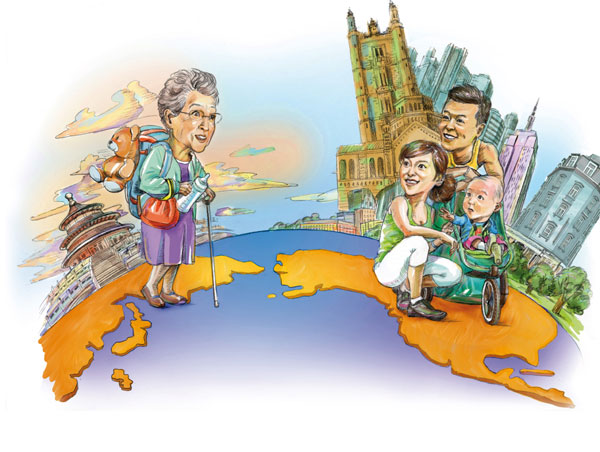Families feel the pull of 'gravity'
Updated: 2013-07-22 06:30
By Yu Ran (China Daily)
|
|||||||||||
More Chinese parents moving overseas to be with children, Yu Ran reports in Shanghai.
An increasing number of young Chinese who left home to study in overseas universities have decided to settle in their host countries. They have secured good jobs, married and are raising families. Now many are urging their parents to join them.
Liang Lixia, a 55-year-old retiree from Shijiazhuang, Hebei province, has been living for three years with her daughter, son-in-law and granddaughter in a large, three-story house in Auckland, New Zealand.
 |
|
Ma Xuejing/ China Daily |
"My daughter chose to stay in New Zealand after graduation. My husband and I respected her decision and have tried to make her life easier by moving here to live with the family," said Liang, who has been granted permanent residence in New Zealand after being sponsored by her daughter, an accountant at a local company.
The country's parental "Center of Gravity" regulations mean parents can be sponsored for residency if "the principal applicant parent has no dependent children, and the number of their adult children lawfully and permanently in New Zealand is equal to or greater than those lawfully and permanently in any other single country", according to the website of Immigration New Zealand.
"I came here to take care of the 4-year-old and make sure that my daughter and son-in-law have more time and energy to earn money for the family. That means I am just a babysitter for the moment," laughed Liang.
China has become New Zealand's largest source country for immigrants approved through the parental category, accounting for 47 percent of all immigrants in the country last year.
On average, 10.7 percent of immigrants to New Zealand were aged 50 or older in 2012. However, the number from China accounted for 39.9 percent of the total, meaning four in every 10 Chinese who gained permanent resident status in 2011 and 2012 were within that age group, according to the latest statistics from Immigration New Zealand.
"We applied for permanent residence simply to spend more time with my daughter and her young family," said Liang.
Her daughter began studying in New Zealand in 2002. She married a local man in 2008, two years after graduation, and gave birth to a baby girl a year later. When the little girl was 3-months-old, she was taken to China so Liang could look after her, leaving the parents free to devote themselves to their fledgling careers. Two years later, the girl was taken back to New Zealand to attend kindergarten.
Liang now spends her days in Auckland taking care of her granddaughter, cooking and keeping the large house spick and span.
"I also have time to drive around and take part in some of the activities of the nearby Chinese community. I am also trying to learn English," she said.
With regard to her future plans, she is unsure if she and her husband will continue to live with her daughter in their later years.
"Although the living environment is good in New Zealand, we would still prefer to spend our later years with friends and relatives back in China - it's where we belong, it's in our blood."
She added that they will probably return to live in China permanently in two or three years when their granddaughter begins primary school. After that, they will travel to New Zealand every year to spend a few months with the family.
Related Stories
Pros and cons of emigrating from China to US 2013-04-19 09:38
More new emigrants find success 2012-12-18 02:04
Emigrants happy to return home 2012-07-01 08:06
The rich emigrate, the poor suffer 2011-11-15 07:57
Chinese rich are keen to emigrate 2011-11-03 08:08
Half of China's millionaires consider emigration 2011-11-01 14:00
Today's Top News
Victory improves Abe's hand
Portuguese govt to stay in power for crisis
Nation's first flight to Sansha planned
EU regulation enhances toy safety on China
Minister rules out stimulus package
Police meets GSK representative after scandal
New Belgian king faces challenge
Protests across US over verdict
Hot Topics
Lunar probe , China growth forecasts, Emission rules get tougher, China seen through 'colored lens', International board,
Editor's Picks

|

|

|

|

|

|





